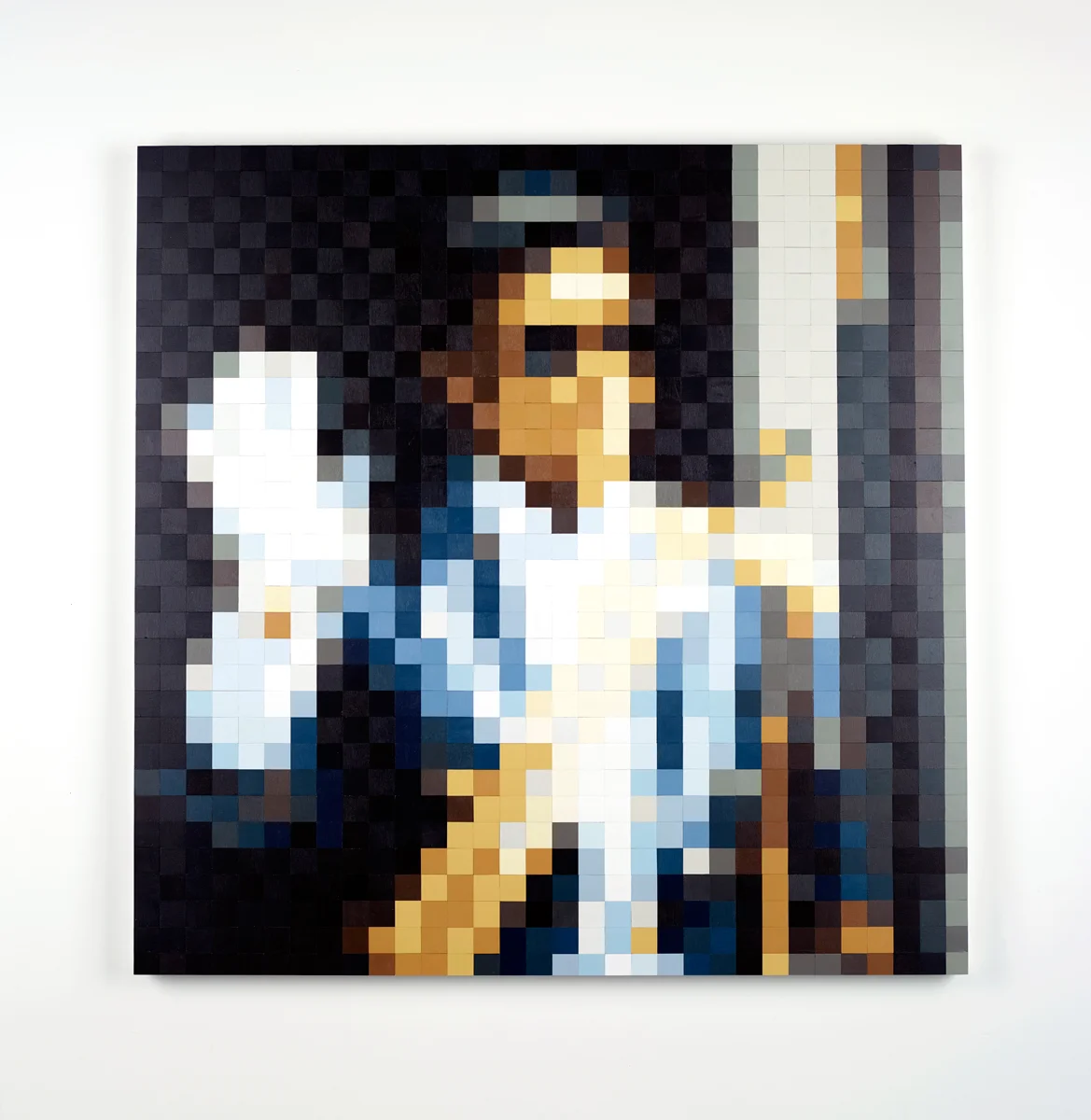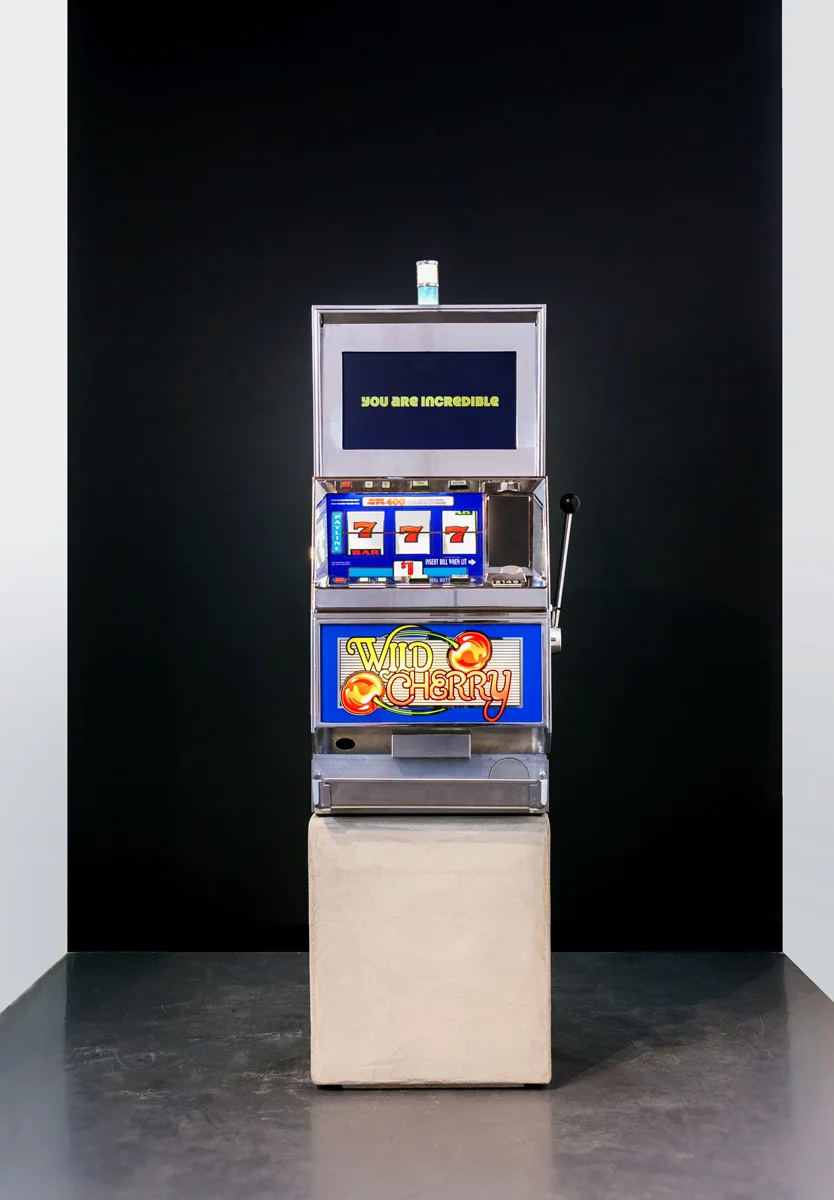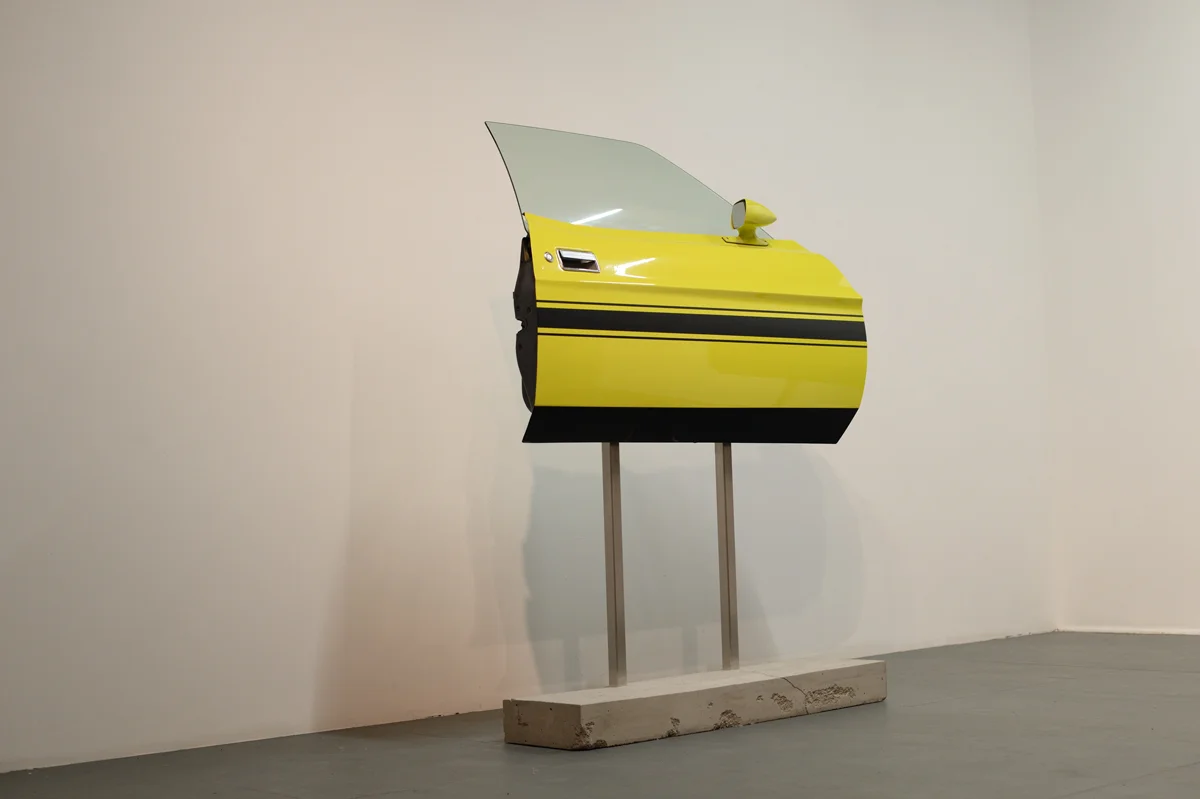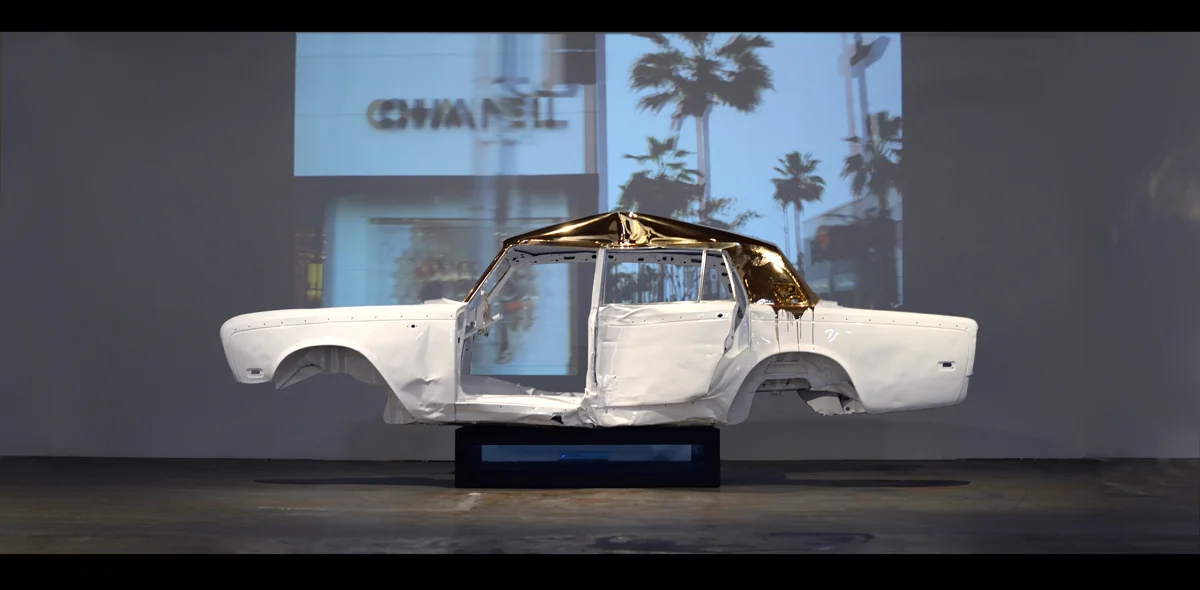
“Guns of Cinema series, Killer Looks,” (2014). Unique silver gelatin, acrylic polymer, gesso, epoxy resin, wood, aluminum, composite panel. 40 x 60 x 2 inches. Courtesy the artist.

“Blanket’s Father,” (2015). Acrylic on 1,024 birch wood blocks on mounted panel. 48 x 48 x 2 inches. Courtesy the artist.

“You Are A Winner,” (2015). Wild Cherry slot machine with aluminum and 1:31 single channel video on concrete base. 46 x 21 x 20 inches. Courtesy the artist.

“Made Man,” (2015). 1968 Cadillac Coupe De ville door, glass, aluminum and concrete. 42 x 53 x 9 inches. Courtesy MAMA Gallery, Los Angeles.

“Rodeo Drive,” (2015). Found Rolls Royce car body, powder coat, chrome, automotive finish, steel, polished aluminum, plexiglass, 11:16 single channel video. 57 x 183 x 63 inches. Photo: E. Leon Myers. Courtesy MAMA Gallery, Los Angeles.

“Cameras of Cinema series, Above 50 mph,” (2014). Unique silver gelatin, acrylic polymer, gesso, epoxy resin, wood, aluminum, composite panel. 48 x 48 x 2 inches. Courtesy the artist.
[](#)[](#)
JAMES GEORGOPOULOS
Attention: Bus for the Camp Mohawk Basketball Game Leaving in 15 Minutes
Painter, sculptor, and installation artist James Georgopoulos takes the pursuit of pleasure very seriously—and not only his own. He has a profound curiosity as to the eclectic gamut of fantasies, consumer luxuries, pricey pastimes, and irrational desires that motivate each of us to varying degrees. Money. Beauty. Power. Fame. All of these find perfect confluence in the world of fine art, wherein expensive objects are made and consumed on a spectacular level—and Georgopoulos often works directly with the iconography of these appetites—cars, jewels, sex, Wall Street. But there are other kinds of pleasures, more conceptual and sublime; of simple or alluring loveliness such as one might find in nature, ice cream, remembered scents, or games of chance. These also find their way into Georgopoulos’ work.
His most recent exhibition, There Is No End at Los Angeles’ MAMA Gallery, featured a sculptural series using damaged classic cars, a wishing well, an edition of gold bars in homage to the world’s richest men, images of horseracing and the space race, a portrait of Michael Jackson made in his signature painted pixelation style, and perhaps most saliently: a working vintage slot machine.
We spoke to the artist as he took a road trip through rural Maine. It turns out he goes there a lot. He grew up in New Hampshire and vacationed there as a kid with his family. He went away to summer camp in that part of the country, too. And now as an adult, although he would continue living in L.A., he’s thinking of moving his art studio there—a sort of Georgopoulos Summer Camp, for adults.
Fittingly, it was from this idyllic, fraught, inspirational place of camp and simple pleasures that Georgopoulos created the cover art for this very issue. Inspired by the iconic film _Meatballs_, which embodies both meanings of the word “camp,” he created a new work of pixelated painting—what he calls The New Element Series—in a labor-intensive process involving transforming appropriated images into studies in optical dimensionality that reference the digital age even as their surfaces thwart the digital camera sensors’ attempts to resolve the pixelation.
For Georgopoulos, it’s about reclaiming media overload, forcing the viewer to engage with the image content rather than just passively observing it. The brain can’t help but get caught up in finishing the image itself. Like a puzzle, or a game played with very high-end pieces. These works interrupt the pace of media consumption; reorient the viewer into a new context of the present moment, of authentic craft and subliminal messages.
“I’m trying to present all the possibilities of something,” says Georgopoulos, “beyond what is expected. Take the slot machine from the show for example. It’s about addiction and gratification, of course. But it’s also a wonder of design and craft, and a well-honed tool for manipulating human emotion. And then after that, there is all that it means. Most people think slot machines are for sad people, but for me a store full of them like where this one came from—it’s a candy store. And like so much, the works change with the mood of the viewer. It’s that private context that makes it Pop Art or political commentary.”
The way Georgopoulos remembers it, summer camp is kind of like that too—it depends on the camper. It can be night terrors and _Lord of the Flies_, or ghost stories and melty s’mores. Friendships last a lifetime, but so do scars. Jimmy Georgopoulos went to Camp Belknap, the same place Steve Jobs first went and then returned to as a counselor—and which Jobs credited with instilling his legendary leadership skills. Jimmy didn’t have that experience. He was homesick and cried quite a bit, and he knows for sure they were not allowed to have candy. Sewing your name in your underwear is no small feat when it’s Georgopoulos. But in craft shop… well that was a different story, “We got to work with baked enamel powders and machine tools. Once we made medals that were later passed out to sporting events winners. I got one of them and felt quite proud—until I realized later that I’d just gotten one because I’d made them!” Still it seems like he learned a lesson there.
He further realized that “camp” isn’t about getting back to nature per se, or it doesn’t have to be. “It’s really about change, escape, gaining new perspectives.” Being liberated, being scared, being independent. Testing the wideness of the world. The fantasy of going there and being relatively isolated, being dedicated for weeks or even months at a time to a whole different way of living, centered around creativity and craft. “But this time,” James Georgopoulos would like you to know, “Candy, booze, and girls definitely allowed.”
